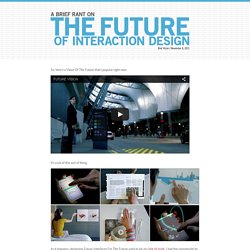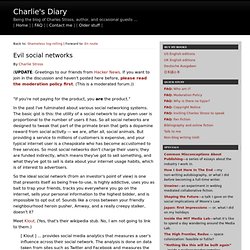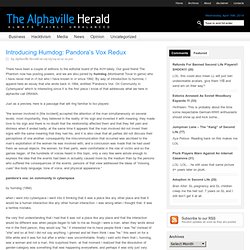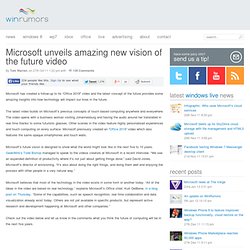

Listen to Alvin Lucier's chilling aural decay. A Brief Rant on the Future of Interaction Design. So, here's a Vision Of The Future that's popular right now.

It's a lot of this sort of thing. As it happens, designing Future Interfaces For The Future used to be my line of work. I had the opportunity to design with real working prototypes, not green screens and After Effects, so there certainly are some interactions in the video which I'm a little skeptical of, given that I've actually tried them and the animators presumably haven't.
But that's not my problem with the video. My problem is the opposite, really — this vision, from an interaction perspective, is not visionary. This matters, because visions matter. This little rant isn't going to lay out any grand vision or anything. Before we think about how we should interact with our Tools Of The Future, let's consider what a tool is in the first place. I like this definition: A tool addresses human needs by amplifying human capabilities.
That is, a tool converts what we can do into what we want to do. Evil social networks. (UPDATE: Greetings to our friends from Hacker News.

If you want to join in the discussion and haven't posted here before, please read the moderation policy first. (This is a moderated forum.)) "If you're not paying for the product, you are the product. " In the past I've fulminated about various social networking systems. The basic gist is this: the utility of a social network to any given user is proportional to the number of users it has. So the ideal social network (from an investor's point of view) is one that presents itself as being free-to-use, is highly addictive, uses you as bait to trap your friends, tracks you everywhere you go on the internet, sells your personal information to the highest bidder, and is impossible to opt out of. Meet Klout.
. [ Klout ] ... provides social media analytics that measures a user's influence across their social network. Sounds harmless enough, at first read. Klout operates under American privacy law, or rather, the lack of it. No, that isn't all. Introducing Humdog: Pandora’s Vox Redux. By Alphaville Herald on 05/05/04 at 12:12 pm There have been a couple of editions to the editorial board of the AVH lately.

Our good friend The Phantom now has posting powers, and we are also joined by humdog (Montserrat Tovar in game) who I have never met in r/l but who I have known in vr since 1992. By way of introduction to hummie, I append here an essay that she wrote back in 1994, entitled “Pandora’s Vox: On Community in Cyberspace” which is interesting since it is the first piece I know of that addresses what we here in alphaville call DRAMA.Just as a preview, here is a passage that will ring familiar to tso players: pandora’s vox: on community in cyberspace by humdog (1994) when i went into cyberspace i went into it thinking that it was a place like any other place and that it would be a human interaction like any other human interaction. i was wrong when i thought that. it was a terrible mistake.
Microsoft unveils amazing new vision of the future video. Microsoft has created a follow-up to its “Office 2019″ video and the latest concept of the future provides some amazing insights into how technology will impact our lives in the future.

The latest video builds on Microsoft’s previous concepts of touch based computing anywhere and everywhere. The video opens with a business woman visiting Johannesburg and having the audio around her translated in real time thanks to some futuristic glasses. Other scenes in the video feature highly personalised experiences and touch computing on every surface. Microsoft previously created an “Office 2019” video which also features the same opaque smartphones and touch walls. Microsoft’s future vision is designed to show what the world might look like in the next five to 10 years. Seven things you should know if you're starting out programming. Three years ago, my boss asked me to head up the then non-existent data journalism unit at the Times.

I'd not written a line of code in my life. As a print journalist, I'd always thought programming was a task undertaken done by awkward guys in loose-fitting T-shirts who rarely saw the sun. (I wasn't altogether wrong about that.) With a little reluctance, I said yes. In the time since, I've learnt a lot about programming. This post is not a coding tutorial. In that spirit, here are some things I've come to learn about programming which I hope may be useful to people thinking about giving programming a try. #1 The 'Logic, not maths' principle One of the greatest misconceptions about programming - certainly at beginner levels - is that it is full of maths. Logic, on the other hand, abounds. . #2 The 'Catch a shooting star' principle The problem with processes is that, unless you do something with their outcomes, they just disappear into thin air. Dan Bull - Thoughts on Porn.